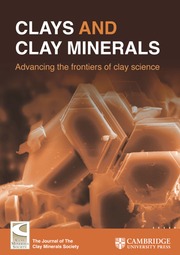Crossref Citations
This article has been cited by the following publications. This list is generated based on data provided by
Crossref.
Hlawatsch, S
Garbe-Schönberg, C.D
Lechtenberg, F
Manceau, A
Tamura, N
Kulik, D.A
and
Kersten, M
2002.
Trace metal fluxes to ferromanganese nodules from the western Baltic Sea as a record for long-term environmental changes.
Chemical Geology,
Vol. 182,
Issue. 2-4,
p.
697.
Kawano, Motoharu
and
Tomita, Katsutoshi
2002.
Microbiotic Formation of Silicate Minerals in the Weathering Environment of a Pyroclastic Deposit.
Clays and Clay Minerals,
Vol. 50,
Issue. 1,
p.
99.
ASADA, Ryuji
and
TAZAKI, Kazue
2002.
A model of Si-biomineralization cycles on the surface of biomats..
Japanese Magazine of Mineralogical and Petrological Sciences,
Vol. 31,
Issue. 1,
p.
62.
Mita, Naoki
and
Miura, Hiroyuki
2003.
Evidence of Microbial Activity in the Formation of Manganese Wads at the Asahidake Hot Spring in Hokkaido, Japan.
Resource Geology,
Vol. 53,
Issue. 3,
p.
233.
Tazaki, Kazue
and
Asada, Ryuji
2003.
2001. A Clay Odyssey.
p.
569.
Fadeeva, N.P.
Bezverbnaja, I.P.
Tazaki, Kazue
Watanabe, Hiroaki
and
Fadeev, V.I.
2003.
Composition and Structure of Marine Benthic Community Regarding Conditions of Chronic Barbour Pollution.
Ocean and Polar Research,
Vol. 25,
Issue. 1,
p.
21.
Štyriaková, I
Štyriak, I
Kraus, I
Hradil, D
Grygar, T
and
Bezdička, P
2003.
Biodestruction and deferritization of quartz sands by Bacillus species.
Minerals Engineering,
Vol. 16,
Issue. 8,
p.
709.
Villalobos, Mario
Toner, Brandy
Bargar, John
and
Sposito, Garrison
2003.
Characterization of the manganese oxide produced by pseudomonas putida strain MnB1.
Geochimica et Cosmochimica Acta,
Vol. 67,
Issue. 14,
p.
2649.
Tebo, Bradley M.
Bargar, John R.
Clement, Brian G.
Dick, Gregory J.
Murray, Karen J.
Parker, Dorothy
Verity, Rebecca
and
Webb, Samuel M.
2004.
BIOGENIC MANGANESE OXIDES: Properties and Mechanisms of Formation.
Annual Review of Earth and Planetary Sciences,
Vol. 32,
Issue. 1,
p.
287.
Tazaki, Kazue
2005.
Microbial Formation of a Halloysite-Like Mineral.
Clays and Clay Minerals,
Vol. 53,
Issue. 3,
p.
224.
Tazaki, Kazue
2006.
Green-tuff landslide areas are beneficial for rice nutrition in Japan.
Anais da Academia Brasileira de Ciências,
Vol. 78,
Issue. 4,
p.
749.
Tazaki, Kazue
and
Morii, Issei
2008.
Microbial Immobilization of Si, Mn, Fe, and Sr Ions in the Nacreous Layer of Sinohyliopsis schlegeli and Environmental Factors.
Earth Science Frontiers,
Vol. 15,
Issue. 6,
p.
54.
WU, ZIJUN
YUAN, LINXI
JIA, NAN
WANG, YUHONG
and
SUN, LIGUANG
2009.
Microbial biomineralization of iron seepage water: Implication for the iron ores formation in intertidal zone of Zhoushan Archipelago, East China Sea.
GEOCHEMICAL JOURNAL,
Vol. 43,
Issue. 3,
p.
167.
Polgári, Márta
Gucsik, Arnold
Bajnóczi, Bernadett
Gótze, Jens
Tazaki, Kazue
Watanabe, Hiroaki
and
Vigh, Tamás
2009.
Cathodoluminescence and its Application in the Planetary Sciences.
p.
127.
HITCHCOCK, A. P.
DYNES, J. J.
LAWRENCE, J. R.
OBST, M.
SWERHONE, G. D. W.
KORBER, D. R.
and
LEPPARD, G. G.
2009.
Soft X‐ray spectromicroscopy of nickel sorption in a natural river biofilm.
Geobiology,
Vol. 7,
Issue. 4,
p.
432.
Lozano, Rafael P.
and
Rossi, Carlos
2012.
Exceptional preservation of Mn-oxidizing microbes in cave stromatolites (El Soplao, Spain).
Sedimentary Geology,
Vol. 255-256,
Issue. ,
p.
42.
Krinsley, David H.
Dorn, Ronald I.
DiGregorio, Barry E.
Langworthy, Kurt A.
and
Ditto, Jeffrey
2012.
Rock varnish in New York: An accelerated snapshot of accretionary processes.
Geomorphology,
Vol. 138,
Issue. 1,
p.
339.
Uckert, Kyle
Chanover, Nancy J.
Getty, Stephanie
Brinckerhoff, William B.
Li, Xiang
Floyd, Melissa
Voelz, David G.
Xiao, Xifeng
Tawalbehy, Rula
McMillan, Nancy
Chavez, Arriana
Boston, Penelope J.
Glenar, David A.
Ecelberger, Scott
and
Cornish, Timothy
2014.
A comparative study of in situ biosignature detection spectroscopy techniques on planetary surfaces.
p.
1.
Bondici, V.F.
Khan, N.H.
Swerhone, G.D.W.
Dynes, J.J.
Lawrence, J.R.
Yergeau, E.
Wolfaardt, G.M.
Warner, J.
and
Korber, D.R.
2014.
Biogeochemical activity of microbial biofilms in the water column overlying uranium mine tailings.
Journal of Applied Microbiology,
Vol. 117,
Issue. 4,
p.
1079.
Wang, Jian Ping
Li, Qiong Fang
Dong, Fa Qin
He, Xin
Zhang, Wei
Yang, Li Jun
and
Zhang, Wen Jing
2015.
Study on Effect Characteristics and Mechanism of <i>Sta</i><i>phylococcus aureus</i> on Albite.
Advanced Materials Research,
Vol. 1092-1093,
Issue. ,
p.
635.


